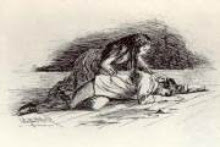“The Wife’s Lament” and New Moon:Abandonment
In the modern Gothic novel New Moon, author Stephenie Meyer addresses female abandonment through the character Bella Swan. Bella responds to the departure of her beloved Edward in a similar fashion to that of the classic Gothic mourning woman in the poem “The Wife’s Lament.” Bella and the wife, as she will be called, are overly dramatic in their separation from their men. Bella refuses to do anything but school and, in the film, looks out a window for four months. The wife lists her woes in the poem emphasizing on her sorrow caused by her lord’s abandonment. Bella focuses her energy on solitude instead of violently expressing her emotion; Bella takes on a zombie like state. The poem and novel similarly portray both women as completely dependent on the man who left her making the abandonment cut much deeper.
In Twilight, the first book of the Twilight Saga, Bella begins to devote her life to Edward Cullen and his family. She spends more time with Edward than any of the other friends she makes in Forks, Washington
“The Wife’s Lament” begins with the wife telling the reader “I am able to tell/ all the hardships I’ve suffered since I grew up,/ but new or old, never worse than now” (lines 2-4). The wife declares she never struggled through something as much as this one event: the leaving of her lord. Bella also faces hardships like death by vampires and almost gets killed in the school parking lot, but not until Edward leaves, do the effects of fear and grief fully consume her. The wife, after her lord’s departure socially struggles as well: “I had few loved ones or loyal friends/ in this country, which causes me grief. / Then I found that my most fitting man/ was unfortunate” (16-19). She strongly feels the abandonment of the lord also due to the fact that she has few relationships. She staked her life and happiness in the lord so when he left, Bella’s thoughts, “Love, life, meaning…over” (Meyer 73), apply to the wife. The wife also notices the absence of the lord as “it is now as if it had never been,/ our friendship” (“The Wife’s Lament” 24-25). Like Bella, his abandonment does not leave her gifts or items to keep in his remembrance. She must hold onto her memories as the only source of connection to him. The wife loses all hope for happiness in the loss of her lord: “so I may never/ escape from the cares of my sorrowful mind” (39-40).
Bella and the wife struggle to allow themselves to let go of the men who hurt them. Both Bella and the wife lack friendships which creates a larger sentiment of loneliness. They lose all hope for the future that they may be at least not miserable let alone find men to attach themselves. The lord and Edward in both cases leave the woman with nothing but a broken heart and desperation. The men leave the women in state where they “must suffer longing for a loved one” (54).
Work Cited
“The Wife's Lament.” Trans. Kevin Crossley-Holland. The Longman Anthology of British Literature Vol 1A. Ed. David Damrosch and Kevin J.H. Dettmar. New York: Pearson Longman, 2006. 157-158.
Wife: Gwenyth Paltrow
Husband: Colin Firth






